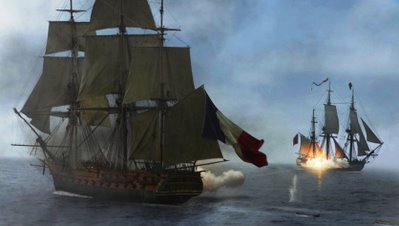 Master and Commander: The Far Side of the World (2003)
Master and Commander: The Far Side of the World (2003)Director: Peter Weir
As the world has gotten smaller and easier to negotiate through electronic means and jet-fueled transport, would-be adventurers have had to venture further and further out of reach. Many victims of modern ennui have turned upward, crawling up Everest like a foolish band of ants to a flame; inward, looking for an inner space of boundless creativity; or outward to the stars, intrigued by the weird and wondrous forms from the postcards sent by unmanned explorers named Hubble and Voyager. Filmmakers have reflected these new frontiers, abandoning the thrilling quests of old in the Wild West, in darkest Africa, and on the high seas for the quaint relics they are.
Thus, Master and Commander: The Far Side of World was a risky venture for Twentieth Century Fox and its production partners to launch. Although Patrick O’Brian’s maritime book series upon which the film was based is very popular, its fan base doesn’t exactly approach the size and fanaticism of, say, Harry Potter loyalists. If the movie were to do well, it would have to appeal to more than the history buffs and be more than a modernized swashbuckler. It would have to create wonder.
I don’t think Master and Commander created as much wonder in as many people as it should have, but I, for one, was completely captivated, convinced, transported, and thrilled by this
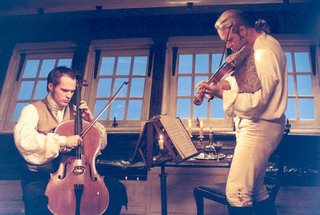 elegant recreation of a time and place where wonders never ceased for those who lived in it. The time was the early 1800s. Jack Aubrey (Russell Crowe), captain of the H.M.S. Surprise is patrolling in the waters near South America for ships in Napoleon’s fleet. A blow against a French ship will be a blow for England and for the crew’s wallets when they claim the prize of the captured ship and its cargo. Sailing with Aubrey as the Surprise’s surgeon is his friend Stephen Maturin (Paul Bettany), doctor, amateur naturalist, and civilian. The two men play classical music together and act as each other’s confidante and adviser.
elegant recreation of a time and place where wonders never ceased for those who lived in it. The time was the early 1800s. Jack Aubrey (Russell Crowe), captain of the H.M.S. Surprise is patrolling in the waters near South America for ships in Napoleon’s fleet. A blow against a French ship will be a blow for England and for the crew’s wallets when they claim the prize of the captured ship and its cargo. Sailing with Aubrey as the Surprise’s surgeon is his friend Stephen Maturin (Paul Bettany), doctor, amateur naturalist, and civilian. The two men play classical music together and act as each other’s confidante and adviser.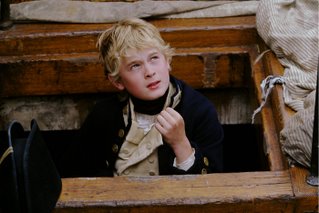 Along on this voyage is midshipman Lord Blakeney (Max Pirkis), an aristocrat of about 14 years of age. Aubrey takes Blakeney and his young friend, midshipman Peter Calamy (Max Benitz), under his wing in training them to be officers. Among the other assorted officers are first lieutenant Tom Pullings (James D’Arcy), veteran seaman Master Allen (Robert Pugh), and midshipman Hollom (Lee Ingleby), who lacks the confidence and leadership for his own command.
Along on this voyage is midshipman Lord Blakeney (Max Pirkis), an aristocrat of about 14 years of age. Aubrey takes Blakeney and his young friend, midshipman Peter Calamy (Max Benitz), under his wing in training them to be officers. Among the other assorted officers are first lieutenant Tom Pullings (James D’Arcy), veteran seaman Master Allen (Robert Pugh), and midshipman Hollom (Lee Ingleby), who lacks the confidence and leadership for his own command.One foggy evening, Hollom thinks he spies a ship on the horizon. Aubrey and Pullings seek the ship, but see nothing. Hollom hesitates about what he saw, and the crew stands down. Only moments later, the Surprise is fired upon and sustains casualties and damage. The chase is on after the “ghost ship” that hides in the fog, a French ship called the Acheron.
Young Blakeney took wood shrapnel in his arm during the attack and develops life-threatening gangrene that requires that he have his arm amputated. Aubrey visits him in his bunk and makes him a gift of a personally inscribed book about the exploits of Lord Nelson, the one-armed idol of every man on board and once Aubrey’s commander. Aubrey is a leader of men who also can pay individual attention to each man.
The Acheron proves a fast ship and a worthy adversary. It gets the jump on the Surprise by hiding in coves along the shore. Unable to outrun the Acheron, Aubrey creates a decoy. His crew builds a buoy with a light to mimic the stern of the Surprise. “Mr. Calamy,” he says, “You have your first command,” as he sends the midshipman out to float the buoy away from the Surprise. The Surprise then tacks away from the buoy, and all on board listen triumphantly as they hear the Acheron fire on the decoy.
The trick buys Aubrey time to make repairs at the nearby Galapagos Islands. Maturin is in hog heaven, hearing as he has of the strange life forms the Galapagos are said to contain. Blakeney mentions that he sees a lizard swimming in the water. Maturin says lizards
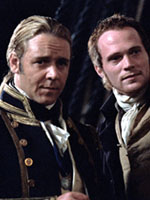 don’t swim. Blakeney replies, “This one does.” Maturin is stunned by the discovery of a swimming iguana. He combs the island collecting specimens, one more fascinating than the next, with Blakeney and an ordinary seaman at his side. When they reach the other side of the island, Blakeney spies the Acheron hiding in a harbor. The naturalist and his charges drop their treasures and race back to Aubrey, who immediately prepares to set sail. Maturin protests that he wishes to remain on the island, particularly since Aubrey is exceeding the mandate of his orders in following after the Acheron. Aubrey rebuffs him harshly, putting his mission ahead of Maturin’s "silly" hobby. Later, he will redeem himself after Maturin is shot in a freak accident by returning the ship to the Galapagos so that the bullet can be removed safely on solid land.
don’t swim. Blakeney replies, “This one does.” Maturin is stunned by the discovery of a swimming iguana. He combs the island collecting specimens, one more fascinating than the next, with Blakeney and an ordinary seaman at his side. When they reach the other side of the island, Blakeney spies the Acheron hiding in a harbor. The naturalist and his charges drop their treasures and race back to Aubrey, who immediately prepares to set sail. Maturin protests that he wishes to remain on the island, particularly since Aubrey is exceeding the mandate of his orders in following after the Acheron. Aubrey rebuffs him harshly, putting his mission ahead of Maturin’s "silly" hobby. Later, he will redeem himself after Maturin is shot in a freak accident by returning the ship to the Galapagos so that the bullet can be removed safely on solid land.Aubrey pursues the French vessel around the treacherous Cape Horn. As the icy waters and high seas batter the ship’s sails, popular Able
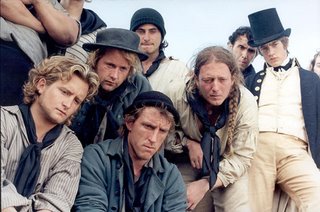 Seaman Joe Plaice (George Innes) is sent up the mast to tie them down. When he gets into trouble, Mr. Hollom is sent up to rescue him. Hollom freezes in fear, however, and the mast breaks off with Joe clinging to it and must be cut free to prevent the ship from sinking. The crewmen hold Hollom personally responsible for Joe’s death, and their disrespect for him causes Aubrey to order the flogging of one of the men. Soon thereafter, the ship hits the doldrums, and the superstitious crew blames Hollom as bad luck personified. His loneliness and feelings of being out of place are wrenching and tragic.
Seaman Joe Plaice (George Innes) is sent up the mast to tie them down. When he gets into trouble, Mr. Hollom is sent up to rescue him. Hollom freezes in fear, however, and the mast breaks off with Joe clinging to it and must be cut free to prevent the ship from sinking. The crewmen hold Hollom personally responsible for Joe’s death, and their disrespect for him causes Aubrey to order the flogging of one of the men. Soon thereafter, the ship hits the doldrums, and the superstitious crew blames Hollom as bad luck personified. His loneliness and feelings of being out of place are wrenching and tragic.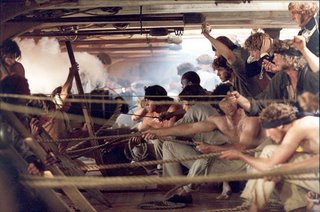 Eventually, Aubrey catches the Acheron’s scent again when they come upon some merchant seamen adrift after their ship was attacked. Aubrey devises another trick that will help the Surprise move next to their quarry and pummel them with cannon fire, thus piercing the Acheron's state-of-the-art double-hull design with close-range fire and allowing them to board the ship and take control.
Eventually, Aubrey catches the Acheron’s scent again when they come upon some merchant seamen adrift after their ship was attacked. Aubrey devises another trick that will help the Surprise move next to their quarry and pummel them with cannon fire, thus piercing the Acheron's state-of-the-art double-hull design with close-range fire and allowing them to board the ship and take control.Master and Commander is a film that goes from strength to strength. Following the blueprint of authenticity that made the O’Brian books so popular, this film is a time machine. The crew is covered with the scars of battles past, including star Russell Crowe, whose mangled ear presents prominently and unvaingloriously in several scenes. The customs of the British Navy at this time are well observed, from the manner of salutes given to the officers, to the details of a flogging, to the medical practices of the time, and the fine craftsmanship of the carpenters who were always aboard to build spare parts, make repairs, and fashion objects in their idle time that collectors can’t get enough of these days. It’s odd to see such young men in such responsible positions, but to quote from another period drama, Interview with the Vampire, “Times were different them. I was a man and master of an estate.” The cast is strong, right down to the smallest of speaking roles, and make their somewhat idealized relish of service and adventure real and breathing.
Crowe is a perfect balance of humanizing camaraderie, self-assurance, and leadership. He’s a muscular actor who is at his best in muscular roles, such as Aubrey or Bud White in L. A. Confidential. Paul Bettany is an actor’s actor who disappears into every role. In this one, Maturin’s intelligence and civilian railing at military protocol seem to ooze out of every pore.
Weir creates a world both exciting and tedious, horrifying to a modern audience in its crudeness (Maturin must remove the bullet from his own shoulder in a wince-inducing scene), but modern to its inhabitants, as Aubrey admires the inventive construction of the Acheron through a model built from memory by two able seamen who saw it being constructed in an American port. Most of all, Weir brilliantly stages battles at sea. Listen carefully to Aubrey’s plan to defeat the Acheron, then watch as every detail of his plan is put into action in the ensuing engagement. It’s a brilliant bit of filmmaking that pays tribute to the art of battle strategizing and execution. I’m going to quote Aubrey’s plan here. Print it off and then read it after you see the film. See if Weir doesn’t manage the whole scene exactly as planned:
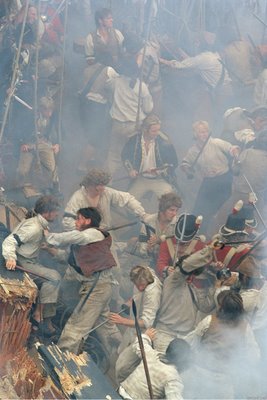 Right lads, now, I know there's not a faint heart among you, and I know you're as anxious as I am to get into close action. But we must bring them right up beside us before we spring this trap. That will test our nerve, and discipline will count just as much as courage. The Acheron is a tough nut to crack... more than twice our guns, more than twice our numbers, and they will sell their lives dearly. Topmen, your handling of the sheets to be lubberly and un-navy like. Until the signal calls, you're to spill the wind from our sails, this will bring us almost to a complete stop. Gun crews, you must run out and tie down in double quick time. With the rear wheels removed, you've gained elevation, and without recoil, there'll be no chance for reload, so gun captains, that gives you one shot from the lardboard battery... one shot only. You'll fire for her mainmast. Much will depend on your accuracy... however... even crippled, she will still be dangerous, like a wounded beast. Captain Howard and the marines will sweep their weather deck with swivel gun and musket fire from the tops. They'll try and even the odds for us before we board. They mean to take us as a prize.
Right lads, now, I know there's not a faint heart among you, and I know you're as anxious as I am to get into close action. But we must bring them right up beside us before we spring this trap. That will test our nerve, and discipline will count just as much as courage. The Acheron is a tough nut to crack... more than twice our guns, more than twice our numbers, and they will sell their lives dearly. Topmen, your handling of the sheets to be lubberly and un-navy like. Until the signal calls, you're to spill the wind from our sails, this will bring us almost to a complete stop. Gun crews, you must run out and tie down in double quick time. With the rear wheels removed, you've gained elevation, and without recoil, there'll be no chance for reload, so gun captains, that gives you one shot from the lardboard battery... one shot only. You'll fire for her mainmast. Much will depend on your accuracy... however... even crippled, she will still be dangerous, like a wounded beast. Captain Howard and the marines will sweep their weather deck with swivel gun and musket fire from the tops. They'll try and even the odds for us before we board. They mean to take us as a prize.It isn’t easy these days to shoot a film that can make the breath quicken in excitement and a whole world of adventure come alive. Big-screen interpretations of comic book heroes and scifi aliens have, paradoxically, cramped our imaginations. I never expect to be as dazzled and delighted by a tricked-up action movie as I am by Master and Commander: The Far Side of the World. This film is the greatest swashbuckler of all time. l


4 Comments:
At 9:24 PM, Roderick Heath said…
Roderick Heath said…
Master and Commander has grown on me enormously to the point where I can safely say it's one of my favorite recent films. But it still needs tightening in the middle third and there's just no chance it's the greatest swashbuckler of all time. I'm not really sure it is a swashbuckler. Swashbucklers are jaunty action films. M&C is more a straight war film with a setting usually reserved for swashbucklers. If it's one, so are Waterloo and Barry Lyndon.
At 8:41 AM, Marilyn said…
Marilyn said…
You have a point, Rod, and I didn't call it a swashbuckler lightly. For me, the term is really a personal reaction to the film. It thrilled me like a swashbuckler, in fact, more than any swashbuckler in the canon. It has that spirit of adventure, like a Jason and the Argonauts or The Black Pirate, as personified by Aubrey being ripe for the chase despite his orders. I don't agree about the middle of the picture. The authenticity adds to the impact of the sudden spotting of the Acheron and gives a fuller picture of life on the ship. I was literally swept away by the film.
At 6:45 PM, Mark said…
Mark said…
I loved this movie. It inspired me to read all 20 books of the series. Yes, all 20 :) The movie is actually a conglomeration of events in the book series, not just the first book.
At 2:51 AM, free movies said…
free movies said…
I don't have much to say about the film.I haven't seen the complete film.I like the camera work which gives film a good look.I like to see trailer of the movie.
Post a Comment
<< Home